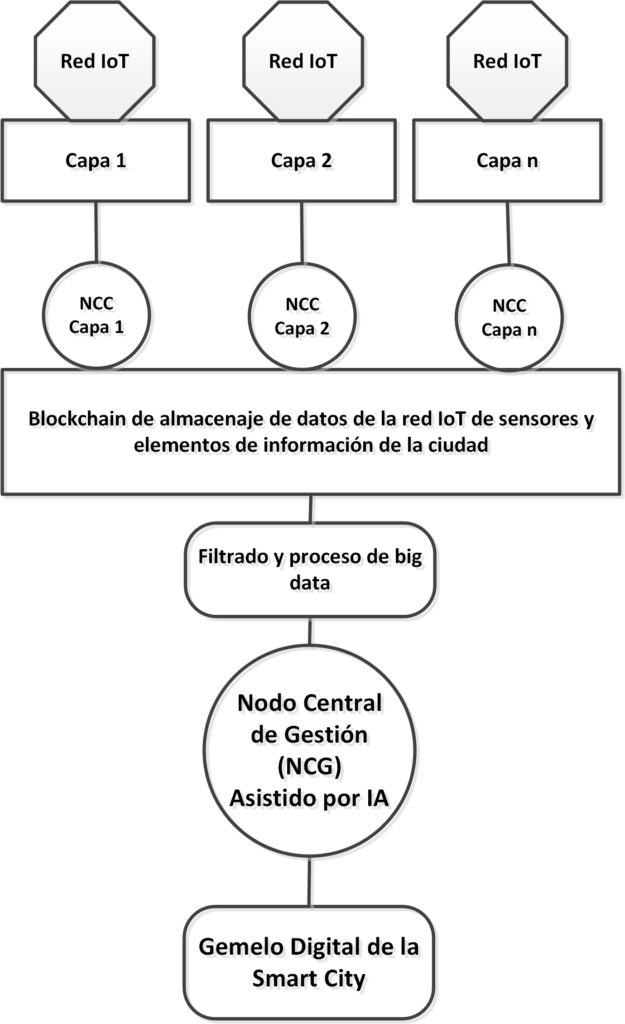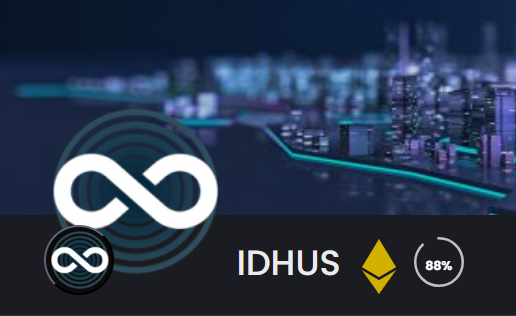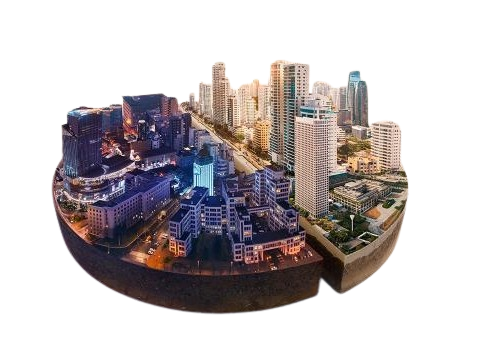Together with the IDHUS Institute, we are developing the Smart Cities Cohesive Model (SCCM), a framework for transforming our cities into Smart Cities using the most disruptive technologies and integration and development mechanisms that enable our cities to offer us a high quality of life, be environmentally friendly and optimise the resources needed for all of us who use them.
Disruptive technologies and smart management systems for urban transformation
 The SCCM is a model for planning and developing the set of systems, technologies and applications that facilitate the transformation of a city into a Smart City. It is organised and structured into different layers, or levels, which are interrelated and coordinated by a central data processing and management node, from which all the parameters and data collected by the different infrastructures that form part of the services and elements that make the city function can be monitored.
The SCCM is a model for planning and developing the set of systems, technologies and applications that facilitate the transformation of a city into a Smart City. It is organised and structured into different layers, or levels, which are interrelated and coordinated by a central data processing and management node, from which all the parameters and data collected by the different infrastructures that form part of the services and elements that make the city function can be monitored.
Each of the control and management layers of the systems that make up the SCCM is in turn coordinated by a communications and data processing node or hub for that layer or level (for example, the ecosystem layer that regulates the entire ‘green’ part of a city, such as its parks, trees and landscaped areas), so that all the data collected by the IoT, communications and monitoring networks of these elements are supervised and analysed in their own ‘central layer node’ (NCC). Then, all the processing nodes at each level are, in turn, regulated and coordinated by a central hub monitored by AI (NCG), which assists technicians and city managers in making sense of the millions of data packets, information and content that a city generates on a daily basis.
A blockchain-based platform to manage the cities of the future
 The SCCM includes a blockchain-based platform to monitor, collect data and manage the services and infrastructure of a Smart City. Data from the IoT networks of each layer of the MCCI is dumped directly into the blockchain, enabling secure verifications and transactions on the Internet, data storage and the execution of smart contracts that allow us to revolutionise the management of Smart Cities, with solutions to coordinate, integrate and control different city services with transparency, efficiency and privacy.
The SCCM includes a blockchain-based platform to monitor, collect data and manage the services and infrastructure of a Smart City. Data from the IoT networks of each layer of the MCCI is dumped directly into the blockchain, enabling secure verifications and transactions on the Internet, data storage and the execution of smart contracts that allow us to revolutionise the management of Smart Cities, with solutions to coordinate, integrate and control different city services with transparency, efficiency and privacy.
A digital twin to monitor the smart city
With all the data collected by the city’s sensors and made available to its technical and management services, stored securely on a blockchain network and with multiple options for using that data to analyse the behaviour of the city’s systems and infrastructure, it is essential to take advantage of the potential offered by having millions of pieces of information on many aspects of the Smart City without losing sight of the big picture. To this end, the SCCM includes the creation of a complete digital model of the city where we can see, in real time, the development and status of the parts we are monitoring in it.
$IDH Token – Managing smart city services and applications
 IDH is the native token of the SCCM, which powers Smart City applications and services. It is an ERC20 token created on the Ethereum blockchain to facilitate connectivity, interoperability and management of all blockchain-based systems, applications and technologies used in the development and implementation of different applications and services for Smart Cities. The mission of the IDH token is to ensure proper functioning and allow the different systems within a Smart City to operate and be supervised from its central management and control mechanisms.
IDH is the native token of the SCCM, which powers Smart City applications and services. It is an ERC20 token created on the Ethereum blockchain to facilitate connectivity, interoperability and management of all blockchain-based systems, applications and technologies used in the development and implementation of different applications and services for Smart Cities. The mission of the IDH token is to ensure proper functioning and allow the different systems within a Smart City to operate and be supervised from its central management and control mechanisms.
Information and updates on the IDHUS Institute project’s page

